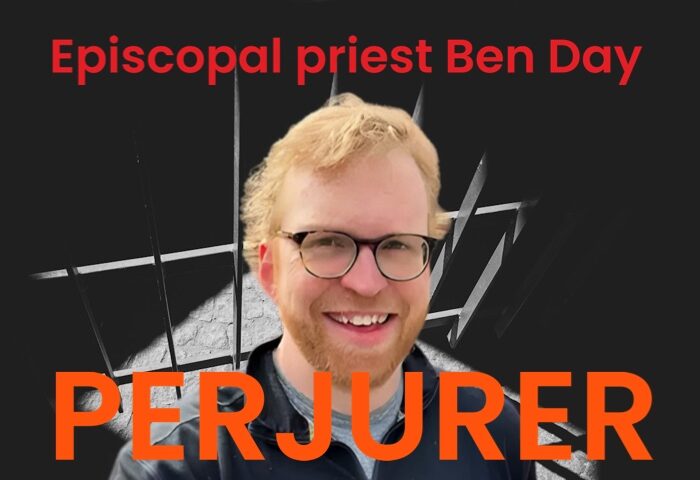The Title IV clergy disciplinary case against Episcopal priest Ben Day has been referred to an investigator. The decision to investigate was made by the Title IV reference panel, which under church canons comprises the intake officer, the bishop diocesan, and one other member of the diocesan clergy disciplinary committee.
Allegations against Day include sexual abuse by having a physical relationship with a person to whom he previously had provided pastoral care; courtroom perjury; child abuse; filing a false police report; conduct unbecoming; and making false statements to voters as a candidate for a local political office; abuse of power; and more.
The next step in the Title IV disciplinary process will be to have an investigator research these allegations. From there, the matter returns to the Title IV reference panel, which has several options for referral:
- No action other than pastoral response
- Terms of discipline (agreed to with bishop)
- Send to conciliation – further investigation
- Send directly to the Conference Panel, which is the intermediary stage of a clergy disciplinary hearing.
The matter continues to return to the Reference Panel at each stage until the matter is resolved, with the final stage a hearing panel, which has the authority to issue a mandatory order against the clergy person.
Clergy must maintain confidentiality during the intake and conference panel phases. Hearing panel proceedings are open proceedings, except when discussing confidential matters pertaining to a victim.
Complainants are not bound by confidentiality, and any attempt to impose confidentiality is unethical, although complainants should be warned that they may face retaliation from other church members should they chose to disclose their role in the matter.
Meanwhile, in the criminal case Day has filed against former parishioner Art Blackburn, Day is known to be pulling down YouTube videos that could constitute statements against interest and otherwise engage in spoliation of evidence. We also believe he is suborning perjury from one witness in the case and has engaged in multiple efforts to tamper with the case.
Most recently, Day has asked the judge to issue an injunction prohibiting Blackburn from discussing the matter with third parties in an effort to interfere with media coverage and the current Episcopal Diocese of Atlanta investigation into Day’s conduct. Such an order would violate the First Amendment, and Anglican Watch will continue to report on the case, regardless of any order the Cobb County courts may issue.
We continue to encourage members of Christ Church to withhold all funds from the church until Day is removed from his position as rector. His conduct is outrageous and appalling and has no place in any faith community.


While the wording of Title IV, Canon 19.11, is a bit ambiguous, ordained complainants would be well advised to maintain confidentiality. Any public comments about a Title IV complaint could be construed as an attempt to “improperly influence.” From a practical standpoint, public discussion based on partial awareness of the facts of a situation is rarely helpful.
Yes. Indeed, laity who disclose will experience retaliation. While Title IV does not cover laity, we have yet to see a situation that did not result in blowback.
Bishop Lucinda Ashby in the Diocese of El Camino Real appears to have no hesitation to retaliate against laity who lodge complaints.
This past week, the intake officer in the Diocese of ECR resigned in the middle of a Title IV complaint process.
That happened here in DioVA: An intake officer was so appalled at diocesan behavior that she quit. Another one was shoved out when HRH Shannon Johnston decreed him unwelcome.
Feel free to send us details via email if you’d like us to cover the situation in ECR.
The terms “confidentiality” and “boundaries” are a manifestation of privileged elites who want to control the narrative.
Secrecy in regards to disciplinary proceedings are quite often is a sin, in and of itself.
When the church refuses to identify its abusers, the cycle of abuse is perpetuated.
The process is supposed to protect the victims – but IMO, it tends to mostly protect the abusers.
PS I once had a Canon to the Ordinary here in DioVA demand to know why I published details of a Title IV complaint when I had been “directed” not to do so.
My response:
1) Title IV only applies to clergy
2) It is inherently abusive to tell a victim to remain silent.
3) It’s my story to tell.
4) Having refused to address my complaint, the diocese DOES NOT get to decide how I respond to its corruption.
There was more, but you get the gist.
– Eric B
Yes, it is your story to tell or not to tell.
You should not have to explain your trauma in order to receive spiritual support.
HOW can Ben Day keep lying that his wife wasn’t a parishioner at Christ Church in Kennesaw when Anglican Watch has already published a photo of her at that very same church? What’s the plan here? How many visits does it take to be considered a parishioner?